Italian streetwear brand P448 is set to release a new sneaker made from Burmese python in its ongoing efforts to use alternative leathers and raise awareness about invasive species. This sneaker is the latest addition to the brand’s line of shoes made from invasive species, following designs made from lionfish and carp.
The python skins used in the sneakers are sourced from Florida, where the snakes have become an invasive species after being released into the wild by pet owners. This has had a devastating impact on the native species in Everglades National Park, with populations of bobcats, rabbits, and foxes being significantly reduced.
Founder and executive chairman of parent company StreetTrend, Wayne Kulkin, explains that education is a key part of sustainability. Rather than bombarding consumers with facts and figures, P448 aims to create value from new materials and educate consumers about the impact of invasive species.
P448’s “Regenerative Sustainability” initiative aims to make 30 percent of its products from more sustainable materials. The brand tests the python skins at tanneries to ensure their usability and durability for footwear.
Chief product and sustainability officer Sabrina Cohen commends P448 for its commitment to sustainability and its pioneering efforts in the field. The Burmese python sneaker features repurposed python skin from the invasive species in the trim, as well as other sustainable materials such as Evolo-certified velour and recycled outsoles, lining, laces, and eyelets.
To accompany the launch of the sneakers, P448 will release a film that follows environmentalists and removal contractors as they work to remove invasive species from the ecosystem. This film follows the success of their previous film about lionfish, which was featured in the London Fashion Film Festival.
The limited-edition Burmese python sneakers will be priced at $595.
In other sustainability news, Zara has introduced its first jacket made from Loopamid, a textile made from 100 percent textile waste. Developed jointly by Zara’s parent company Inditex and chemical producer BASF, Loopamid is designed to be recycled repeatedly while maintaining the same characteristics as virgin polyamide.
Zara launched Loopamid with a campaign featuring model Irina Shayk. BASF is working to scale up the technology for wider availability in the market, and Inditex’s chief sustainability officer Javier Losada emphasizes the importance of collaboration and innovation in driving sustainability in the textile industry.
Under Armour and chemical company Celanese Corp. have developed a new fiber called Neolast for performance stretch fabrics that has the potential to be recycled. This addresses the challenge of recycling elastane, or Spandex, which has yet to be solved in the apparel industry. Under Armour plans to work with Celanese to research recycling systems for the new fiber and reduce elastane dependence in sportswear.
Overall, these brands are demonstrating their commitment to sustainability by using alternative materials, developing recycling technologies, and educating consumers about the environmental impact of their products.




